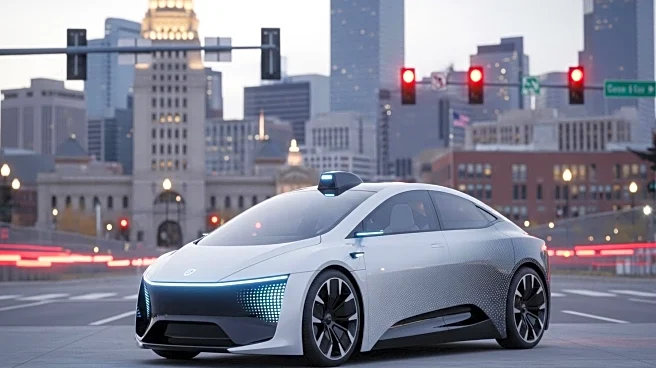What is the story about?
What's Happening?
Waymo, a subsidiary of Alphabet, has announced plans to introduce its self-driving car service in the Denver metro area by 2026. The company will begin with an exploratory phase to understand the local driving environment and engage with community partners. Initially, a dozen autonomous vehicles will be deployed for training purposes, with human operators present but not driving. Waymo aims to offer a fully autonomous ride-hailing service once safety and validation tests are completed. The service will utilize advanced technology designed to handle winter weather conditions, featuring electric vehicles equipped with sensors and lidar technology.
Why It's Important?
Waymo's expansion into Denver represents a significant development in the autonomous vehicle industry, potentially transforming local transportation options. The introduction of self-driving cars could enhance mobility, reduce traffic congestion, and offer a new mode of transportation for residents. The move also positions Denver as a key player in the growing field of autonomous technology, attracting investment and innovation to the region. However, the deployment of driverless vehicles raises questions about safety, regulatory challenges, and the impact on existing transportation services. The initiative reflects broader trends in the adoption of autonomous technology across the U.S.
What's Next?
Waymo plans to collaborate with local officials and first responders during the exploratory phase to ensure the safe integration of its autonomous vehicles into Denver's transportation system. The company will conduct extensive testing and validation before launching its ride-hailing service. As the rollout progresses, Waymo will likely face scrutiny from regulators and the public regarding safety and operational effectiveness. The success of the initiative could influence the expansion of autonomous vehicle services in other cities, shaping the future of urban transportation.
Beyond the Headlines
The introduction of self-driving cars in Denver may have broader implications for urban planning and infrastructure development. As autonomous technology becomes more prevalent, cities may need to adapt their road systems and traffic management strategies to accommodate driverless vehicles. The initiative also raises ethical considerations regarding the displacement of traditional driving jobs and the potential for increased surveillance through vehicle sensors. The evolution of autonomous transportation could lead to shifts in societal norms and expectations around mobility and privacy.
















